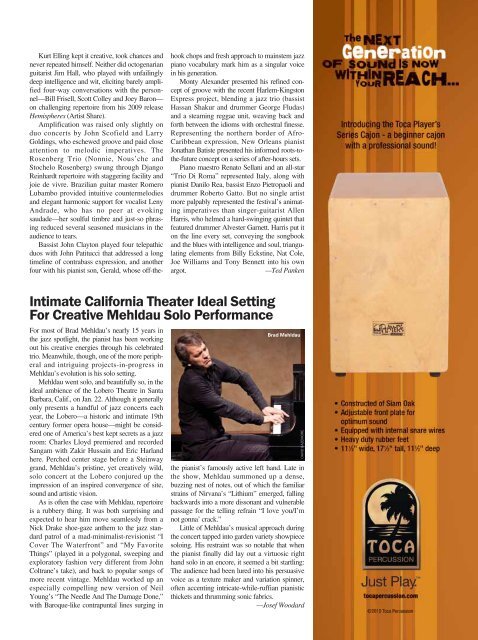Download - Downbeat
Download - Downbeat
Download - Downbeat
- No tags were found...
You also want an ePaper? Increase the reach of your titles
YUMPU automatically turns print PDFs into web optimized ePapers that Google loves.
Kurt Elling kept it creative, took chances andnever repeated himself. Neither did octogenarianguitarist Jim Hall, who played with unfailinglydeep intelligence and wit, eliciting barely amplifiedfour-way conversations with the personnel—BillFrisell, Scott Colley and Joey Baron—on challenging repertoire from his 2009 releaseHemispheres (Artist Share).Amplification was raised only slightly onduo concerts by John Scofield and LarryGoldings, who eschewed groove and paid closeattention to melodic imperatives. TheRosenberg Trio (Nonnie, Nous’che andStochelo Rosenberg) swung through DjangoReinhardt repertoire with staggering facility andjoie de vivre. Brazilian guitar master RomeroLubambo provided intuitive countermelodiesand elegant harmonic support for vocalist LenyAndrade, who has no peer at evokingsaudade—her soulful timbre and just-so phrasingreduced several seasoned musicians in theaudience to tears.Bassist John Clayton played four telepathicduos with John Patitucci that addressed a longtimeline of contrabass expression, and anotherfour with his pianist son, Gerald, whose off-thehookchops and fresh approach to mainstem jazzpiano vocabulary mark him as a singular voicein his generation.Monty Alexander presented his refined conceptof groove with the recent Harlem-KingstonExpress project, blending a jazz trio (bassistHassan Shakur and drummer George Fludas)and a steaming reggae unit, weaving back andforth between the idioms with orchestral finesse.Representing the northern border of Afro-Caribbean expression, New Orleans pianistJonathan Batiste presented his informed roots-tothe-futureconcept on a series of after-hours sets.Piano maestro Renato Sellani and an all-star“Trio Di Roma” represented Italy, along withpianist Danilo Rea, bassist Enzo Pietropaoli anddrummer Roberto Gatto. But no single artistmore palpably represented the festival’s animatingimperatives than singer-guitarist AllenHarris, who helmed a hard-swinging quintet thatfeatured drummer Alvester Garnett. Harris put iton the line every set, conveying the songbookand the blues with intelligence and soul, triangulatingelements from Billy Eckstine, Nat Cole,Joe Williams and Tony Bennett into his ownargot.—Ted PankenIntimate California Theater Ideal SettingFor Creative Mehldau Solo PerformanceFor most of Brad Mehldau’s nearly 15 years inthe jazz spotlight, the pianist has been workingout his creative energies through his celebratedtrio. Meanwhile, though, one of the more peripheraland intriguing projects-in-progress inMehldau’s evolution is his solo setting.Mehldau went solo, and beautifully so, in theideal ambience of the Lobero Theatre in SantaBarbara, Calif., on Jan. 22. Although it generallyonly presents a handful of jazz concerts eachyear, the Lobero—a historic and intimate 19thcentury former opera house—might be consideredone of America’s best kept secrets as a jazzroom: Charles Lloyd premiered and recordedSangam with Zakir Hussain and Eric Harlandhere. Perched center stage before a Steinwaygrand, Mehldau’s pristine, yet creatively wild,solo concert at the Lobero conjured up theimpression of an inspired convergence of site,sound and artistic vision.As is often the case with Mehldau, repertoireis a rubbery thing. It was both surprising andexpected to hear him move seamlessly from aNick Drake shoe-gaze anthem to the jazz standardpatrol of a mad-minimalist-revisionist “ICover The Waterfront” and “My FavoriteThings” (played in a polygonal, sweeping andexploratory fashion very different from JohnColtrane’s take), and back to popular songs ofmore recent vintage. Mehldau worked up anespecially compelling new version of NeilYoung’s “The Needle And The Damage Done,”with Baroque-like contrapuntal lines surging inBrad Mehldauthe pianist’s famously active left hand. Late inthe show, Mehldau summoned up a dense,buzzing nest of notes, out of which the familiarstrains of Nirvana’s “Lithium” emerged, fallingbackwards into a more dissonant and vulnerablepassage for the telling refrain “I love you/I’mnot gonna’ crack.”Little of Mehldau’s musical approach duringthe concert tapped into garden variety showpiecesoloing. His restraint was so notable that whenthe pianist finally did lay out a virtuosic righthand solo in an encore, it seemed a bit startling:The audience had been lured into his persuasivevoice as a texture maker and variation spinner,often accenting intricate-while-ruffian pianisticthickets and thrumming sonic fabrics.—Josef WoodardDAVID BAZEMORE
















